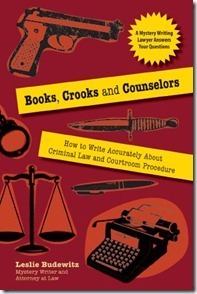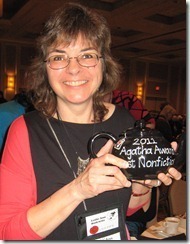Elizabeth Spann Craig's Blog, page 176
June 21, 2012
Why I Prefer Social Media Promo to In-Person
by Elizabeth S. Craig, @elizabethscraig
 Thursday, my daughter reminded me that she has a particular book assigned to read for a summer reading project for school.
Thursday, my daughter reminded me that she has a particular book assigned to read for a summer reading project for school.
My children now usually read books on ereaders, but I’ve found they have a tougher time using ebooks for school projects. They like to underline important passages and flip through the book looking for specific parts. Although they can do that on an ereader, they haven’t gotten used to doing it.
So yesterday, I went to the bookstore in search of Hoot by Carl Hiaasen.
I’ll admit—I haven’t been in a bookstore for a long time. In fact, considering how much we all read in our family—it’s been a very long time. We’re downloading everything we read.
Sure enough, the staff in the bookstore had changed since the last time I’d been in. My heart was beating fast. I had a new book out—it released June 5. Penguin always arranges excellent shelf-placement. I knew there would be plenty of copies. And I knew I should sign them while I was in the store. I knew that an “Autographed Copy” sticker on the outside of a book will sell books.
I’d made excuses twice in the last couple of weeks and passed two bookstores in the car that I should have popped into.
I took a deep breath and I went to the “New Book” tower that was right by Barnes and Nobles’ café, in the middle of the main aisle. Sure enough, there were several copies there in prime location. I gathered them up and waited at the customer service counter.
A young guy came up. “Hi,” I said, clearing my throat. “Do you have any ‘autographed copy’ stickers? I’m—well, I’m running errands and I thought I’d sign my books while I’m in here.”
He looked at the book cover and then at me. “You’re Elizabeth Craig?”
“That’s right.” I fumbled in my pocketbook for my driver’s license (although my picture was in the back of the book…duh) and he said, “Oh, that’s okay.” He pulled up the title on the computer and said, “You’ve got a couple of other copies over in the mystery section. I’ll get them.”
“Thanks.”
He did and I signed the books quickly. I always, always feel like a total fraud. I don’t know what an author looks like, but I’ve always suspected they look more like Ernest Hemingway than I do. And they probably don’t decide to sign stock on the spur of the moment and while sporting disreputable looking tee shirts, shorts, flip flops, and an unacceptable lack of make-up. Heck, maybe he wouldn’t have recognized me from my picture in the book.
And then there’s the fact that sometimes I sign the stock in that store under a couple of different names. The staff in that store that I do know usually call me ‘Riley’ when I walk in.
And--there's the fact that I'm embarrassed my nearest bookstore doesn't know me. That's because I download my books on an eReader...which will likely mean their jobs will eventually evaporate. It doesn't exactly make me feel good.
He watched me as I signed the books. I failed at the small talk.
“Are they selling well?” I finally asked in a small voice.
He looked at the computer again and the reorders. “Seem to be.”
The thing is, signing stock is easy. It doesn’t get any easier than that. And it still frazzles me.
But when the store suggested that I do a signing there, I smiled. “No thanks. That is—well, I’m just swamped right now. But thank you. I might have to take you up on that another time.”
Because signings are total torture. The only way I’ll do signings now is when I’m with other authors. And I know I’m not supposed to do group signings because they’re not profitable—potential readers are usually reluctant to approach a whole gaggle of writers at a table. They might not want to buy all the books at the authors’ table. They worry that might hurt the feelings of the writers of the books they don’t choose.
So signings are hit and miss. Signing stock all over the place means filling up the car with gas a lot. How can we reach people all over the world—for free? Without feeling like a fraud? Without thinking we should be dressed up?
Social media.
I used to feel guilty about the fact that I don’t make many in-person appearances. But now? I think my time is better-invested in platform building.
As a midlist writer, why would I want to do a signing? Readers aren’t going to come to a bookstore just to see me. Not realistically. That means I’m counting on the chance that random people who have walked through that bookstore door for a SF/F, a romance, a beach book, or a kid’s school summer book project, will want to buy a book just because I’ve signed it. A book in a genre they probably don’t read.
To me—that’s just an inefficient use of my time. If there’s one thing the new world of author promo has taught me, it’s that we have to invest our limited time into what works.
For me, that’s not meeting readers face-to-face. If anything, my decidedly unpolished social skills and introverted nature are more likely to scare off potential readers.
Exceptions—reader conferences (like Malice Domestic or Book ‘Em) and book clubs. Places where the readers want to meet writers. Not just random shoppers in bookshops.
But—I happen to know that several regular commenters here have really nailed in-person appearances and have maximized them to pull in new readers and make sales. I’d love to hear from y’all….maybe it’ll at least get me out of my house to sign stock in the other Charlotte area stores. :)
In person promo? Social media promo? Which do you like and why?
June 19, 2012
Summer Writing—Writing around Children
by Elizabeth S. Craig, @elizabethscraig
![Girl on a red carpet--Felice Casorati (1883-1963)[2]](https://i.gr-assets.com/images/S/compressed.photo.goodreads.com/hostedimages/1405208723i/10362009.jpg) Hi everyone! Hope you all had a good past week and are enjoying the start of your summer.
Hi everyone! Hope you all had a good past week and are enjoying the start of your summer.
I’ve had sort of a double-whammy (triple whammy?) recently. During the past week, school was out, I was traveling out of town with my family, and I’ve been working on a book that’s due to my editor in about a week and a half.
Summers are challenging for parent writers who are used to a schedule. Although it’s tempting to just chuck the writing for the summer, I’ve usually got a book due during the summer months…and I’ve found it’s just not a good idea for me to take a break from writing. It makes it that much harder to jump back into.
During the past couple of weeks, I’ve seen tweets and blog post comments from parents…wondering how to make their writing happen over the summer.
I think you have to try different approaches. I can tell you what’s worked for me—and different things have worked when my children were different ages. What I didn’t want was for them to see my writing as something that was keeping us from doing fun things together—but I still needed to get it done. I think it’s gone well and that they’ve respected me for carving out time for something that’s important to me. This is how I’ve worked it:
Toddlers:
I won’t say it’s not tough. But this was how I wrote a book with a toddler in the house (and, yes, it’s been a while.)
1. Quiet time (not naptime) for both of you. They “read” books or baby magazines (keep running by the library to get different board books and magazines like Baby Bug.) You write at the same time. Shoot for a page, if you can.
2. Naptime. This is not my favorite option because there is so much else to do during naptime. But sometimes I didn’t have another option.
3. TV (if you’re a TV family.) I’m not proud of this, but TV was honestly the most consistently successful method I had for writing each day. And the 20 minutes of daily TV hasn’t seemed to scar or developmentally-delay my now-10 year old. Every toddler has a favorite show—for mine it was old Teletubby tapes and Sesame Street. In those 20 minutes, I could write a page. It might not have been award-winning writing, but it was a page. And I could fix it after I finished the draft.
4. The timer. Now, you have to work up to this with toddlers and some days it will be a total disaster. Start with 2-3 minutes. Keep your door cracked. See how far you can work your way up. When I was done with my writing, I played a game with my kids.
5. Remember—some days will be better than others. Take advantage of the good days. Don’t let the bad ones bother you.
Older Kids:
This seems like it should be easier than dealing with toddlers, but I’ve found it can be tougher. That’s because older children can make you feel guilty.
1. Timer. I lived by it. And I explained when they could interrupt me.
2. Kid boredom can totally derail your day. Sometimes it’s better to have a friend over at your house. Choose the friend wisely.
3. Bunch errands together or try to schedule a day just to do errands. Or do errands when your partner comes home at night, if you have that luxury. Doing one or two errands every single day can really put a dent in your writing time.
4. Learn to write on location. If you have kids who need a little less supervision, you can write at the skating rink, the bowling alley, or the swimming pool. Again, sometimes this is easier if your child invites a friend.
5. Write early. Or write after everyone turns in.
6. Bring the kids onboard with your writing. Tell them what you’re working on. Sometimes it just looks like you’re on the computer and they don’t really understand what you’re doing.
7. Have the kids help you out. There’s an age when they really want to help you with housework (unfortunately, this blissful era has passed at my house.) You can have more time if you’re not spending as much time cleaning. For some reason, mine especially liked doing laundry. I had a stool in the laundry room so they could reach the washer and a reminder note taped on the wall that explained what went into warm loads and cold ones.
8. Unless you’re under deadline—don’t try to catch up. It’s incredibly frustrating to not only write your goal for that day, but to also try to write the missed goal for a previous day. Just pick up where you left off.
Okay, that’s what’s worked for me, for what it’s worth! Does anyone else have any tips for writing around children/grandchildren? Or, for non-parents, how to fit writing into a chaotic schedule, in general?
I'm also on the Chistled in Rock blog today, with a short interview along with two other authors. Hope you'll pop over: http://bit.ly/MLwvIe .
Image: Girl on a Red Carpet—Felice Casorati (1883—1963)
June 16, 2012
Twitterific
by Elizabeth S. Craig, @elizabethscraig
Twitterific is a compilation of all the writing links I shared the previous week.
The links are fed into the
Writer’s Knowledge Base
 search engine (developed by writer and software engineer
Mike Fleming
) which has over 16,000 free articles on writing-related topics. Sign up for our
free newsletter
for monthly writing tips and interviews with top contributors to the WKB or
like us on Facebook
.
search engine (developed by writer and software engineer
Mike Fleming
) which has over 16,000 free articles on writing-related topics. Sign up for our
free newsletter
for monthly writing tips and interviews with top contributors to the WKB or
like us on Facebook
.
It's looking like tomorrow is going to be a catch-up day for me, so I'll be back to posting on my usual schedule on Wednesday. Hope everyone will have a great start to their week!
Remaining true to our own vision, as writers: http://bit.ly/LacwDi @writeitsideways
Is your inspiration holding you back? http://bit.ly/LacBag @fuelyourwriting @SWFICreative
How to Test Market Your Book Idea with a Blog: http://bit.ly/JXzP7o @JFBookman @NinaAmir
A Plot Template to Keep you on Target: http://bit.ly/JXzVMd @Janice_Hardy
What if self-publishing is only a stepping stone? http://bit.ly/MCPNQ3
@Porter_Anderson @Victoria_Noe
Characters need clear-cut goals: http://bit.ly/JXAbLf @karalennox
Dust Off Your Poetry and Get It In a Book: http://bit.ly/JXAvti @magdalenaball
Creating an Emotional Connection With Your Readers: http://bit.ly/JXAzt6 @DianeAlberts
Examples showing how 1 writer engages his reader: http://bit.ly/JXAOEv @KathrynCraft
5 Tips to Endear Readers to Your Story: http://bit.ly/JXB9Hj
How writing is like a 1st date: http://bit.ly/JXBfP5 @NovelRocket
Transfer Your Confidence to Your Writing: http://bit.ly/JXBoSC
13 Theatrical Terms in Popular Usage: http://bit.ly/JXBtpw @writing_tips
Story milestones in the Hunger Games: http://bit.ly/NK26wQ @storyfix
How to join Twitter chats: http://bit.ly/NK2dbJ @michellerafter
Writers Don't Have to Re-Invent the World: http://bit.ly/NK3yiR via @BretBallou
What makes a children's book great: http://bit.ly/NK3Fe7 @pubperspectives
How (Not) to Be Awesome on Social Media: http://bit.ly/NK3LCF @ava_jae
Tips for querying your YA manuscript: http://bit.ly/NK3YG1 @howtowriteshop
Grant writing resources for writers: http://bit.ly/NK4bJ7 @sarahrcallender
Lasso your book blurbs, put them on LinkedIn: http://bit.ly/NK4jsa @PublicityHound
David Thorne Earned More With Self-Pub Book Than Traditional Publication: http://bit.ly/NK4rbc @mediabistro
Tips for Working through Writer's Block: http://bit.ly/NK4BPI
Publishing…Welcome to Business 101: http://bit.ly/NK4J1F @behlerpublish
How to Host a Book Giveaway Online: http://bit.ly/NK4OSU @galleycat
Juggling Archetypes: Heroes, Villains and Shapeshifters: http://bit.ly/NK8fJu @PassiveVoiceBlg
3 Keys to Building Platforms: http://bit.ly/NK8kwQ @nickthacker
When Bad Books Happen to Good Writers: http://bit.ly/NK8wvZ @sarahlapolla
Writing horror--past, present, and future: http://bit.ly/NK8ZhK @seanhtaylor
Should you put the price on the cover of your POD books? http://bit.ly/NK9c4t @deanwesleysmith
An Agent on What Editors Have Bought Recently - YA and MG: http://bit.ly/NK9jNB
Get Specific About Your Writing Goals: http://bit.ly/NK9qZh @krissybrady
Self-Editing Tips: Structure: http://bit.ly/NK9B73
A grammar refresher--"between you and I/me": http://bit.ly/NK9WGJ
10 of the best: dates in titles: http://bit.ly/NKa3lP @guardianbooks
How to Respond to Negative Reviews: http://bit.ly/NKaeNM @bethrevis
3 Writing Exercises in Search of a Character: http://bit.ly/NKcdlm @junglereds
11 ideal times to write: http://bit.ly/NKcWmp @raventools
10 Famous Authors' Fascinating Alter Egos: http://bit.ly/NKd7y5 @flavorpill
Tips for writing horror: http://bit.ly/NKdjO6 @litreactor
Nonfiction Authors: How Well Do You Know Your Readers? http://bit.ly/NKdpVK @JFBookman @TheCreativePenn
Your Story in Nine Critical Sentences: http://bit.ly/NKdtou @storyfix
What writers can learn from Barry Eisler: http://bit.ly/Nib0nA
The Amazon effect: http://bit.ly/Nib5I1 @PassiveVoiceBlg
Grammar refresher--lay and lie: http://bit.ly/Nibc6h @theresastevens
Platform: ticket to creative freedom: http://bit.ly/NidbHJ @dirtywhitecandy
How front and back matter can stimulate book sales: http://bit.ly/NidfYb @SueCollier
9 Delightful Library Cats: http://bit.ly/NidsKN
What Is the Story Behind Your Story? http://bit.ly/NidtOO @andilit
How a Book Blogger Tackles Conferences: http://bit.ly/NidyC2
15 Unfinished Books By Great Authors: http://bit.ly/NidGlg @buzzfeed
How To Nail A Successful Author Reading: http://bit.ly/NidJxo
How Many Unique Identifies does one eBook need? http://bit.ly/MHWEhe @jentalty
Taking Care of Your Creative Self: http://bit.ly/MHWOW1
Tips for deepening your characters: http://bit.ly/MHXxGJ
The Two Conflict-Creating Needs of Every Character: http://bit.ly/MHXJ8N @KMWeiland
8 Reasons Why Slow Blogging Will Help Your Career: http://bit.ly/MHXRoP @annerallen
4 Reasons For Making Time to Read: http://bit.ly/MHYgrp @chucksambuchino @DaynaLorentz
Writing is a Business: http://bit.ly/Lz5J6E @novelrocket
Print on Demand–While You Wait: http://bit.ly/Lz5Mzq @livewritethrive
5 etiquette tips for writers: http://bit.ly/Lz5UPz @sierragodfrey
5 Good Stock Image Sites for Bloggers: http://bit.ly/Lz6tJ6 @catseyewriter
The biggest mistake many writers make: http://bit.ly/Lz6vRj @krissybrady
It's not necessary to write every day: http://bit.ly/Lz6Bs2 @jaelmchenry
Protecting Your Professional Reputation: http://bit.ly/Lz6Fbi @CMKaufman
Creative Well Running Dry? Try a Writing Prompt: http://bit.ly/Lz6Kfd @writeitsideways
Skip the "suddenlys" in your story: http://bit.ly/Lz6Rr8 @BryanThomasS
Critique Groups: Why, How and Where: http://bit.ly/Lz70e0 @fictionnotes
When to TELL the Story: http://bit.ly/Lz74uu
Query Musts & Query Faux Pas: http://bit.ly/Lz7wIZ @msheatherwebb
Critique vs. artistic vision: how far should we respond to reader reactions? http://bit.ly/Lz7xN9 @juliettewade
Songwriting Tip: Creating Songs That Stand Out: http://bit.ly/Lz7Fw7
5 Ways Writing is Gardening: http://bit.ly/Lz7GQB @victoriamixon
The Secret To Making A Living As A Writer: Work For Free: http://bit.ly/Lz7L6W @woodwardkaren
Do Your Read Like a Reader or a Writer? http://bit.ly/Lz7JMh @janice_hardy
Marketing Your Debut Novel: http://bit.ly/KyrSXx
13 Things You May Not Know About Agents: http://bit.ly/Lz8jcQ @rachellegardner
Hustling: How to Spread the Word About Your Work: http://bit.ly/Lz8sNr @Janefriedman @chrisguillebeau
5 Steps towards Making Peace with Criticism: http://bit.ly/Lz8BAz
A Good Scene Isn't Written, It's Dramatized: http://bit.ly/Lz8Dsg @mooderino
How To Develop a Story Idea Into a Book: http://bit.ly/Lz8FjY @writersdigest
Quick info on various MFA programs: http://bit.ly/Lz8Mfo @4kidlit
Common problems of female characters: http://bit.ly/Lz8V28 @mistymassey
The Importance of Staying Flexible in a Changing Industry: http://bit.ly/KysOLm @jodyhedlund
A quick comma quiz: http://bit.ly/Lz90TA @writing_tips
The Author as Publisher, Author as Fraud: http://bit.ly/LevGtE @PassiveVoiceBlg
If you call yourself a writer, how do you label yourself? http://bit.ly/Lew3V7 @AnnieNeugebauer @PatrickRwrites
Things to consider before giving up your day job: http://bit.ly/Lewpes @JudeHardin
Free templates and charts to help writers keep organized: http://bit.ly/LeBJyk @AnnieNeugebauer
The Ultimate Guide to Pitch Writing: http://bit.ly/LeD3Bt @jamigold
Publishing must become user-focused: http://bit.ly/MCQ8SM @bsandusky @Porter_Anderson
An Agent's Art: http://bit.ly/MCQJ6L @Porter_Anderson @jasonashlock @RachelleGardner
What publishers should invest in: http://bit.ly/MCR35F @Jane_L @Porter_Anderson
June 12, 2012
Taking a Short Breather
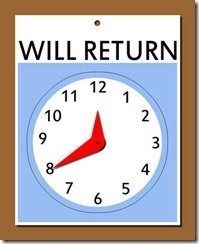 Just a quick note to let y’all know that I’ll be off the grid until my Twitterific post runs on Sunday. I’ve got some family events (all fun stuff) and a deadline I’m juggling, so I figured I’d better take a short blogcation.
Just a quick note to let y’all know that I’ll be off the grid until my Twitterific post runs on Sunday. I’ve got some family events (all fun stuff) and a deadline I’m juggling, so I figured I’d better take a short blogcation.
Happy Writing! :)
June 10, 2012
Write Tip: Surprise v. Suspense by Bryan Thomas Schmidt
by Bryan Thomas Schmidt, @BryanThomasS
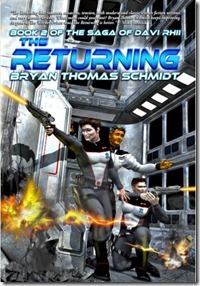 One of the better lessons I learned about storytelling came from my time in film school at California State University, Fullerton, during lessons on story structure and plotting. In talking about how to create suspense, the instructor introduced the concept of two kinds of suspense stories: surprise stories and suspense stories. Although both have similar elements, the type of story very much determines the arrangement of elements and ultimate effect.
One of the better lessons I learned about storytelling came from my time in film school at California State University, Fullerton, during lessons on story structure and plotting. In talking about how to create suspense, the instructor introduced the concept of two kinds of suspense stories: surprise stories and suspense stories. Although both have similar elements, the type of story very much determines the arrangement of elements and ultimate effect.
In a suspense story, we have our protagonist walking on a sidewalk. Then someone else walking ahead drops a banana peel. The suspense is will our protagonist see the peel and sidestep or will he fail to see it and fall.
A surprise story has the protagonist walking on a sidewalk. He passes various people. Then he slips and falls on his butt. Then we discover a banana peel on which he has slipped.
These are not types of stories, mind you, but rather ways of creating tension and pacing to keep your audience interested. Both can be employed in either dramatic or comedic tales but the ultimate effect of one is quite different from the other.
My first Davi Rhii book, The Worker Prince, was very much a suspense story. It was about the coming of age of a Prince who discovers a secret about his past and begins digging into it to uncover who he is. In the process, he uncovers things about his family and government which he had failed to grasp as a youth and begins to doubt and question the morality of decisions and actions which have been taken. Of course, this brings conflict with his family and friends, particularly his Uncle Xalivar, who rules the Borali Alliance as High Lord Councilor. As Davi gets further involved with his birth family and people, the enslaved Vertullians, his life is put in jeopardy and he finds himself being pursued by people who wish to stop his questioning and charge him with crimes. In the end, he’s outcast and joins the Vertullians in a fight for freedom.
There’s much familial and political scheming which occurs in addition to the chasing and accusing of Davi himself. There’s constant tension of loyalties tested and an uncertain outcome to keep the story moving at a nice pace. Action is also employed to keep the story moving at a good clip, as well as interpersonal tension between characters.
But one of the challenges of the sequel is how to capture the feel of the first without retelling the same story. In the case of Star Wars, episode 4 “A New Hope” was Luke Skywalker’s coming of age story. He goes on a quest and finds himself along with, including some friends and companions. This is similar to Davi’s journey in The Worker Prince in many ways.
In the second novel, The Returning, new challenges arise as Davi Rhii’s rival Bordox and his uncle, Xalivar, seek revenge for his actions in The Worker Prince, putting his life and those of his friends and family in constant danger. Meanwhile, politics as usual has the Borali Alliance split apart over questions of citizenship and freedom for the former slaves. Someone’s even killing them off. Davi’s involvement in the investigation turns his life upside down, including his relationship with his fiancée, Tela. The answers are not easy with his whole world at stake.
Like Star Wars V: The Empire Strikes Back, I chose to tell a story with a larger canvass in my second book. Davi is still central but other characters take far larger roles. At the same time, because of the nature of the middle chapter, I knew that while The Worker Prince had an ending which felt like closure, despite the antagonist’s escape, The Returning would be hard to end similarly because so much of it would set up events in the following chapter, The Exodus. For George Lucas, the solution was a chase story. Empire is really as much about Han and Leia’s developing romance on the run from Vader as it is about Luke’s ongoing discovery of his Jedi powers and desire to confront Vader. In my case, The Returning is about Davi and the Vertullians trying to settle into the life they fought so hard for, only to find many people ignoring their victory and, instead, doing their best to through road blocks up at every turn. On top of that, Xalivar and Davi’s rival, Bordox, are back seeking revenge. So, once again, Davi finds himself in jeopardy and the tensions of his life are also threatening his romance with Tela, the woman he wants to marry.
In order to capture the tension I wanted, I decided The Returning should be a surprise story. So I set up a mystery which involves not only the murders of various Vertullians and others but confusion about who’s responsible with a lot of different subgroups scheming and manipulating events so that we don’t really get answers until the end of the book. I also decided to up the emotional stakes for our characters. By putting not only Davi’s romance in jeopardy but the lives of himself, his friends, his family and others as well, I created the kind of tension which had my beta readers commenting: “just when I thought I could breathe again, something else happened to put me back on the edge of my seat.” Much like George R.R. Martin in A Song Of Ice And Fire, the series on which HBO’s A Game Of Thrones is based, I decided to create a situation where as the story progresses, we become less and less confident we know who will survive and how it will end. By finding ways to twist thing suddenly with new complications, much like the unexpected banana peel of our example, I created a fast paced novel which sets up well the third book and still ends with a satisfying conclusion to a middle chapter.
Ultimately, the ending became an almost “Who Shot J.R.” type of cliffhanger, but emotionally left readers relieved they could stop and breathe for a bit while waiting for the concluding book. At least, this is the reaction I’ve gotten from beta readers and reviewers I’ve talked with. I suppose we’ll have to wait until it releases on June 19th to be really certain whether or not I was a success.
Regardless, by arranging the order of events as shown in the examples, you can greatly influence the pace and tension of your story to create the kind of reading experience and page turning effect you desire your readers to have.
What are some ways you go about upping the stakes, the tension, and the pacing? We’d love to learn from your ideas as well.
 Bryan Thomas Schmidt is the author of the space opera novels
The Worker Prince
, a
Barnes & Noble Book Clubs Year’s Best SF Releases of 2011 Honorable Mention
, and
The Returning
, the collection The North Star Serial, Part 1, and several short stories featured in anthologies and magazines. He edited the anthology Space Battles: Full Throttle Space Tales #6 for Flying Pen Press, headlined by Mike Resnick. As a freelance editor, he’s edited a novels and nonfiction. He’s also the host of Science Fiction and Fantasy Writer’s Chat every Wednesday at 9 pm EST on Twitter under the hashtag #
sffwrtcht
. A frequent contributor to Adventures In SF Publishing, Grasping For The Wind and SFSignal, he can be found online as @BryanThomasS on Twitter or via his website. Bryan is an affiliate member of the SFWA.
Bryan Thomas Schmidt is the author of the space opera novels
The Worker Prince
, a
Barnes & Noble Book Clubs Year’s Best SF Releases of 2011 Honorable Mention
, and
The Returning
, the collection The North Star Serial, Part 1, and several short stories featured in anthologies and magazines. He edited the anthology Space Battles: Full Throttle Space Tales #6 for Flying Pen Press, headlined by Mike Resnick. As a freelance editor, he’s edited a novels and nonfiction. He’s also the host of Science Fiction and Fantasy Writer’s Chat every Wednesday at 9 pm EST on Twitter under the hashtag #
sffwrtcht
. A frequent contributor to Adventures In SF Publishing, Grasping For The Wind and SFSignal, he can be found online as @BryanThomasS on Twitter or via his website. Bryan is an affiliate member of the SFWA.
June 9, 2012
Twitterific
by Elizabeth S. Craig, @elizabethscraig
Twitterific is a compilation of all the writing links I shared the previous week.
The links are fed into the Writer’s Knowledge Base  search engine (developed by writer and software engineer Mike Fleming) which has over 16,000 free articles on writing-related topics. Sign up for our free newsletter for monthly writing tips and interviews with top contributors to the WKB or like us on Facebook.
search engine (developed by writer and software engineer Mike Fleming) which has over 16,000 free articles on writing-related topics. Sign up for our free newsletter for monthly writing tips and interviews with top contributors to the WKB or like us on Facebook.
3 tips to stay focused through a long-term project: http://bit.ly/KRCgWz @toddhenry @Porter_Anderson
Writer Confronts Alleged Plagiarist on Video: http://bit.ly/LWlZkT @galleycat
Stalkers in crime fiction: http://bit.ly/NifVF5
June 7, 2012
Fact and Fiction by Leslie Budewitz
As the author of a book that helps writers get the details about the legal world right, I’m sometimes asked why getting it right matters. “It’s fiction,” writers say. “Why does it matter whether I’ve called the crime first-degree murder instead of deliberate homicide, or put a silencer on a revolver?”
Because as writers, we build our fictional worlds one detail at a time. If we get the details wrong–whether it’s foundation or frosting–our readers’ ability to live in that world for a few hours crumbles.
You know what I’m talking about: On page ten, the protagonist describes a hospital “built of cinder block.” You were born in that hospital, been a patient and a visitor, and you know there’s no visible cinder block. Your forehead wrinkles. When he gets in the car you drive, in a color it didn’t come in, you squint and tilt your head.
The author’s losing you. Your knowledge of the details breaks the fragile hold the writer has on you. “The fictive dream,” in John Gardner’s phrase. You may stick with the book if the characters, premise, and writing satisfy you, but if any of those is problematic, you move on. And a serious error may nag at you long afterwards.
The problem is that while the devil may be in the details, so is the magic. A character comes alive by the details used to portray her actions, thoughts, and feelings. The trick, I think, is plausibility. Make the setting and the character action feel real. Like it could have happened that way. Use enough of the right details accurately that the reader trusts you.
Do different stories require a different level of accuracy? There’s a good argument that the greater the suspension of disbelief required, the less the details matter. If your cozy mystery sleuth is a caterer, your readers may care more that you proofed the recipes than whether you accurately described the fingerprinting process. Unless your trusty–and trusting–reader devours cozies on the bus to and from her job in the crime lab. Then, your mistake may mean she chooses another author for tomorrow’s commute.
But I’m persuaded by the flip side of the argument: the further your story ventures from daily reality, the more the details matter. Consider science fiction and fantasy, where worldly details are essential. If you accurately describe something the reader knows well–say, the effects of gravity–she’s more likely to believe your description of the mental powers one acquires stepping through the auric atmosphere of Genicia, third planet in the solar system Sapphire. When she closes the book, she knows–logically–that Sapphire and Genicia don’t exist. But if they did, this is what they would be like.
And it isn’t only readers who care about the details. Agents and editors often cite errors in facts and inconsistent character behavior high on the list of what makes them stop reading.
Still, you can kill yourself–and your story– trying to get everything right. What should you research and what can you let go?
• Check out facts related to major plot elements. If your villain kills his wife with an overdose of insulin, make sure you know it can be done–and how.
• Focus on the dog, not the fleas. Don’t worry over whether a captain or a lieutenant would take charge of an investigation. But get the basic procedures right.
• Verify widely known facts outside your experience. If you’ve never been on a jury, talk with your neighbor who has. What surprised or bothered her, bored or intrigued her? What were courthouse security measures? Where did she park? Did the bailiff bring donuts?
• Don’t risk a mistake in things easily confirmed. If you’ve never seen a purple Subaru, chances are they weren’t made.
• We often make mistakes in things we think we know. If it matters to the story, check it out–or leave it out.
• Historicals attract readers who love history–and some love telling writers where they goofed. Does that mean you can’t write about 14th century England because you weren’t born until 1970, or that you need an MA in the period? No. You need reliable references and an eye for the details that set the scene and bring characters to life.
Do a “facts” draft: Read your ms. with your reader’s hat on. What might the typical reader question? Ask your critique partners to note anything that creases their brow.
And accept that you’ll make mistakes. Don’t let fear paralyze you.
So, when it comes to facts in fiction, where do you draw the line, as a writer–or as a reader?
***
Leslie Budewitz’s first book, Books, Crooks & Counselors: How to Write Accurately About Criminal Law and Courtroom Procedure (Quill Driver Books) won the 2011 Agatha Award for Best Nonfiction. A practicing lawyer, she blogs about ways writers can use the law in their fiction at www.LawandFiction.com .
Leslie’s cozy series, The Food Lovers’ Village Mysteries, set in Jewel Bay, Montana, a small lakeside resort community on the way to Glacier Park that calls itself “a Food Lover’s Village,” will debut from Berkley Prime Crime in 2013. She lives in northwest Montana with her husband, a doctor of natural medicine, and their Burmese cat Ruff, an avid birdwatcher. http://www.lawandfiction.com
June 6, 2012
Using Detective Techniques in Fiction Writing
Today, I’m at a couple of different places (no, not an official blog tour, but I’ve got a few guest spots coming up that coincided with my release.) First I’ll be on P.W. Creighton’s blog with a post for his Intriguing Observations series. I’m pointing out four detective techniques and skills that could be helpful for novelists of all genres.
And to meet the protagonist of my new series, you can pop over to“A Day in the Life of Beatrice Coleman” on Dru’s Book Musings.
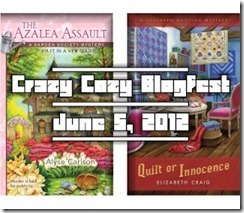 Last, but not least, the results of the Crazy Cozy Blogfest. Please click over to Hart Johnson’s blog for the winning entries (Hart was the brains behind the blogfest!)
Last, but not least, the results of the Crazy Cozy Blogfest. Please click over to Hart Johnson’s blog for the winning entries (Hart was the brains behind the blogfest!)
This was very tough. Honestly, y’all are so good. There were a few stories where I wanted to read the rest of the book! Some made me laugh out loud. I really appreciate your helping celebrate our release in such a fun way! It means a lot to me…and it made for a terrific release day.
Thanks so much again, everyone. You really made it a special day yesterday!
June 4, 2012
How to Launch a Book Without Losing Your Mind
by Elizabeth S. Craig, @elizabethscraig
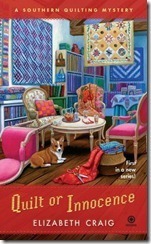 Today is the launch for the first book in a new series—Quilt or Innocence in the Southern Quilting mysteries.
Today is the launch for the first book in a new series—Quilt or Innocence in the Southern Quilting mysteries.
How often will I track its sales numbers? Rarely.
7 Tips for Releasing a Book Without Losing Your Mind:
Get off the grid. That’s right. Take yourself offline. It can be done! The longer I stay offline when I’ve got a release, the more relaxed I feel.
Don’t watch your numbers. Sales numbers will fluctuate…and most of the time we don’t know what’s behind them. It’s sort of like the flapping butterfly wings creating the hurricane.
Don’t read your reviews unless you can be objective. You don’t even have to be objective…being analytical about the reviews is good enough.
Write your next book. Always a good idea to get a jump on a sequel or another standalone.
Write guest posts. Not only will a well-crafted guest post keep you distracted, it will also help circulate that book cover and headshot of yours.
Don’t sweat the stuff that’s out of your control. My book cover and book description for today’s release didn’t appear on Amazon until close to the launch day (I wasn’t the only one this happened to.) This was out of my control…I didn’t worry over it.
Don’t be so wrapped up in your book that every tweet, every blog post, every Facebook update….every message you send out into the world, basically, is about your book. Not only will that drive you crazy, but it’ll drive everyone else crazy, too.
How do you keep yourself distracted when you’ve got a new release?
**********
And now….for the Crazy Cozy Blogfest! :) Hart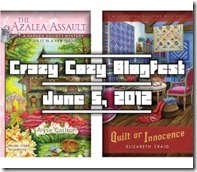 Johnson and I have releases today—the first books of two new series. Our blog hop means that we’ll pop by all the registered blogs and read pitches for the nuttiest cozy mystery premise. Our two favorites will receive signed copies of both our books.
Johnson and I have releases today—the first books of two new series. Our blog hop means that we’ll pop by all the registered blogs and read pitches for the nuttiest cozy mystery premise. Our two favorites will receive signed copies of both our books.
Here’s mine. And this was a lot harder for me than I thought it would be! I think that’s because I spend so much of my time coming up with logical and saleable cozy projects. I’m thinking that my own entry isn’t going to be nearly as entertaining as everyone else’s!
Crazy Cozy Spoof Pitch:
Protagonist: My sleuth is a middle-aged professional sandcastle artist and each book is set at a different beach. Perfect for the beach reading audience! (Okay, on some level, I’m still going…hmm. I could write this…) She’s also a former bounty hunter with lots of experience in bringing in bad guys (now this is where I can no longer sell this book…ha!) And it’s hard for her to walk away from this profession—she still longs for the excitement.
Sidekick: Someone who’s obsessed with metal detecting and travels to these beaches with the sleuth (why not?)
Theme: I guess this would be pitched commercially as beach hobbies?!
Victim #1: I think I’ll go with a cruel lifeguard, here, going along with the beach theme. So, a lifeguard…maybe with a drinking problem. (Shoot…I’m still thinking I could write this…) The victim is found at the beach, dead. He was passed out on the beach and the killer smothered him with a beach towel.
Suspects: In one single day of treacherous rip-currents, three separate swimmers lost their lives while this lifeguard was incapacitated and on duty. So…yeah, lots of people want to kill him. We’ll also throw in a wife who he’s mistreated for years, as the wife’s brother helpfully informs the sleuth. And, what the heck---maybe we’ll also include a jealous husband because the lifeguard was involved with his wife. Even this life guard’s dog doesn’t like him.
Victim #2: The mistreated wife. Bludgeoned with the sleuth’s-sandcastle-creating shovel.
Killer: No, the dog doesn’t do it, only because I can’t think of a way he could have smothered the lifeguard with a beach towel. We’ll have the killer be the wife’s brother. He’s in grave financial straits and knew that the lifeguard and his wife had just won a settlement on a medical lawsuit…he killed them both to get the money. Oh, and the killer is a professional clown. Just because. :)
Looking forward to seeing everyone else’s! And, if you’re looking for a quick summer read for yourself or a friend, Hart and my books aren’t nearly this wacky! And they’re available now: Azalea Assault and Quilt or Innocence. You can find them online or in bookstores in print and in ebook.
Thanks everyone!
June 3, 2012
Style Blunders in Fiction—by Jodie Renner
by Jodie Renner, freelance editor, @JodieRennerEd
No, I’m not talking about the fashion police coming after you. I’m talking about those little errors and bad habits that creep into your manuscript, weaken your message, and add up to an overall feeling of amateurish writing. The good news is that, unlike the more critical creative flow of ideas for plot and characters, these little bad habits are easy to correct, resulting in a much more polished, compelling manuscript.
1. Take out wishy-washy qualifiers like quite, sort of, almost, kind of, a bit, pretty, somewhat, rather, usually, basically, generally, probably, mostly, really, etc. Forget “He was quite brave,” or “She was pretty intelligent” or “It was almost scary.” These qualifiers dilute your message, reduce the impact, and make the imagery weaker. Take them out. Even very is to be avoided—it’s like you’re saying the word after it needs reinforcing. “She was beautiful” packs more punch than “She was very beautiful.”
2. Show us, don’t tell us how your characters are feeling. Avoid statements like, “He found that funny,” or “The little girl felt sad.” Show these emotions by their actions, words, and body language: “Eyes downcast, shoulders slumped, head down, she refused to answer as she pushed her food around the plate.”
3. Avoid colorless, overused verbs like walked, ran, went, saw, talked, ate, did, got, put, took. Get out your thesaurus (or use the MS Word one. Hint: look up the present tense: walk, run, eat, say, etc.) to find more expressive, powerful verbs instead, like crept, loped, stumbled, stomped, glimpsed, noticed, observed, witnessed, spied, grunted, whimpered, devoured, consumed, gobbled, wolfed, munched, or bolted.
4. Avoid –ing verbs wherever possible. Use -ed verbs instead—they’re stronger and more immediate. “He was racing” is weaker than “He raced.” “They searched the house” is more immediate than “They were searching the house.” Rewrite -ing verbs whenever you can, and you’ll strengthen your writing and increase its power.
5. Keep adverbs to a minimum. Instead of propping up a boring, anemic verb with an adverb, look for strong, descriptive, powerful verbs. Instead of “He walked slowly” go for “He plodded” or “He trudged” or “He dawdled.” Instead of “She ate hungrily” say “She devoured the bag of chips,” or “She wolfed down the pizza.” Instead of “They talked quickly,” say “They babbled.”
6. Use adjectives sparingly and consciously. Instead of stringing a bunch of adjectives in front of an ordinary, overused noun, find a more precise, expressive noun to show rather than tell. Overuse of adjectives can also turn your writing into “purple prose”—melodramatic, overly “flowery” writing.
7. Dialogue tags – Stick with the basic he said and she said (or asked) wherever possible, rather than “he emphasized” or “she reiterated” or “Mark uttered,” etc. These phrases stand out, so they take the reader out of the story, whereas “said” is almost invisible. However, I like dialogue tags that describe how something is said, as in he shouted, she murmured, he grumbled, she whispered. You can often eliminate the dialogue tag altogether and just use an action beat instead: He picked up the phone. “That’s it. I’m calling the cops.”
8. Describe the stimulus, then the response: When writing an action scene, make sure your sentence structure mimics the order of the actions. The reader pictures the actions in the order that she reads them, so it’s confusing to read about the reaction before finding out what caused it. So describe the action first, then the reaction: Instead of “He yelled when the dog bit him,” write: “The dog bit him and he yelled.”
9. Avoid the passive voice: For greater impact, when describing an action, start with the doer, then describe what he did, rather than the other way around. Use the more direct active voice wherever possible. Instead of “The house was taped off by the police,” write “The police taped off the house.” Also, avoid empty phrases like “There is”, “There was,” “It’s,” “It was.” Jump right in with what you’re actually talking about.
10. Avoid negative constructions wherever possible – they can be confusing to the reader. Instead of “I didn’t disagree with him,” say “I agreed with him.”
11. Avoid frequent repetition of the same word or forms of the same word. If you’ve already used a certain noun or verb in a paragraph or section, go to your thesaurus to find a different way to express that idea when you mention it again. Also, avoid repetition of the same imagery. Whether you’re describing the setting, the weather, or the hero or heroine, vary your wording.
12. Avoid formal sentences and pretentious language. Rather than impressing your readers, ornate, fancy words can just end up alienating them. As Jessica Page Morrell says, “if a reader is constantly consulting a dictionary when reading your prose, you’re dragging him from the story.[…] Simple words are close to our hearts and easily understood…. simpler words are unpretentious, yet contain power and grace….Pompous words are alienating, boring, and outdated.”
Copyright © Jodie Renner, June 2012
Resources: Thanks, But This Isn’t For Us, by Jessica Page Morrell; Manuscript Makeover, by Elizabeth Lyon; How NOT to Write a Novel, by Howard Mittelmark and Sandra Newman.
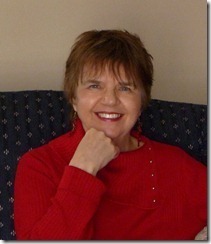 Jodie Renner is a freelance editor specializing in thrillers, romantic suspense, mysteries, and other crime fiction, as well as mainstream, YA and historical fiction. For more info on Jodie's editing services, please visit her website.
Jodie Renner is a freelance editor specializing in thrillers, romantic suspense, mysteries, and other crime fiction, as well as mainstream, YA and historical fiction. For more info on Jodie's editing services, please visit her website.
Image: Flickr—Peter Kaminski
**************************************************
Thanks so much for posting today, Jodie!
Just a reminder…Hart Johnson and I have releases tomorrow (Tuesday, the 5th). If you’d like to participate in a fun, easy blog-hop, sign up here.

